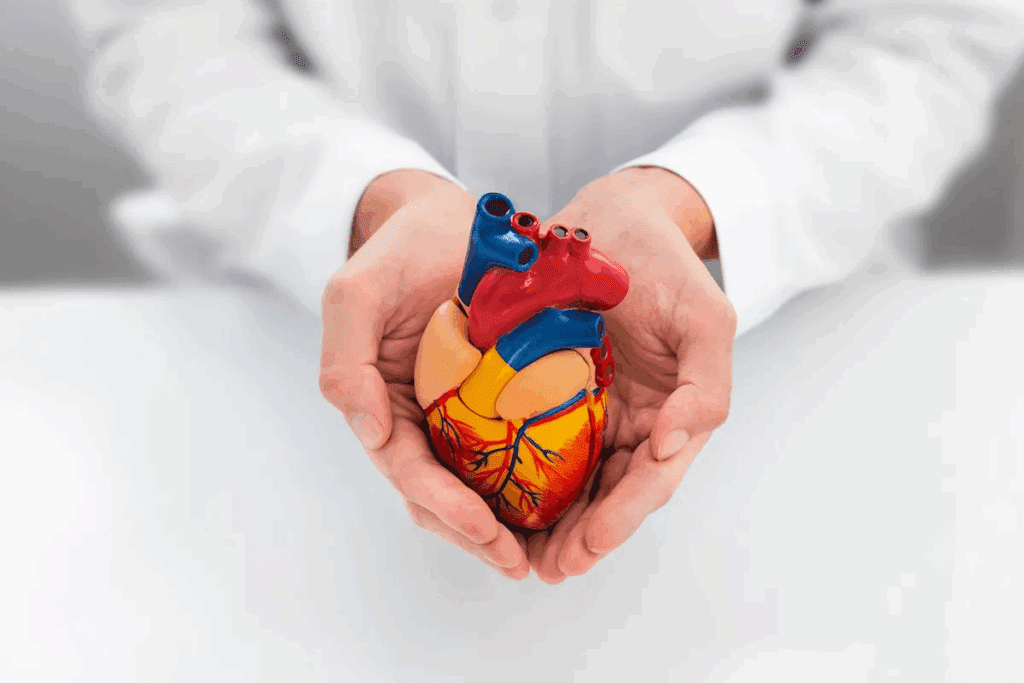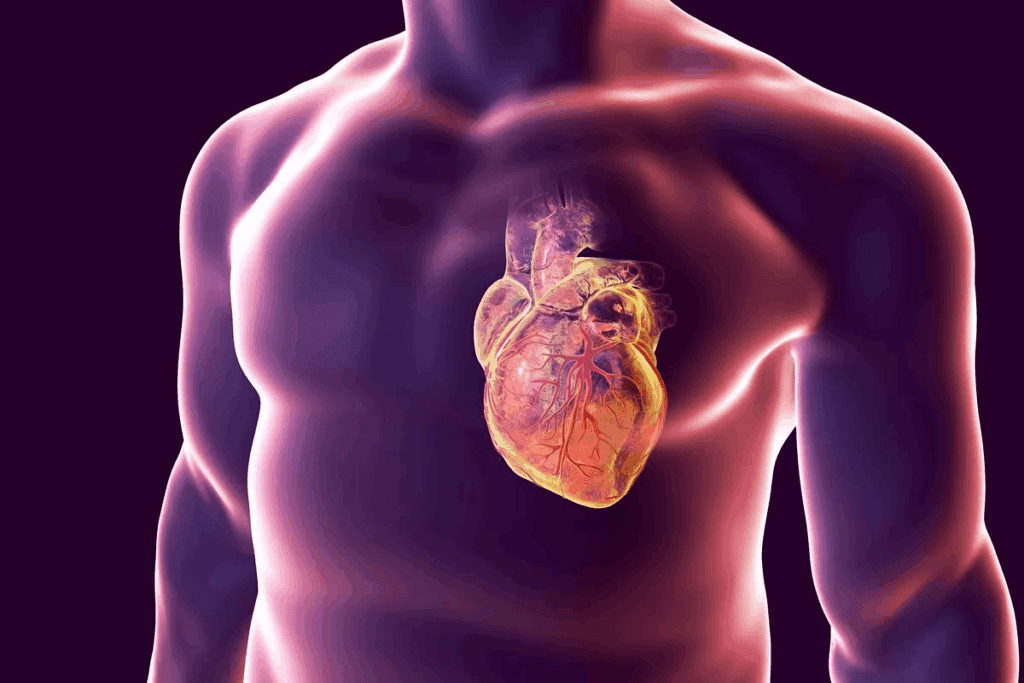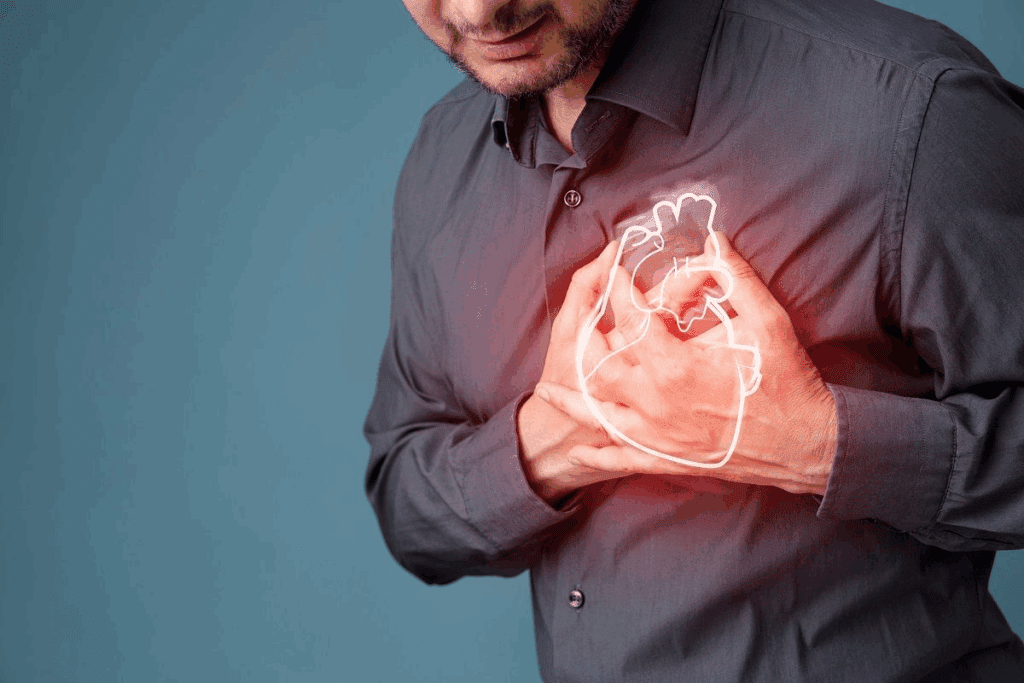Last Updated on November 25, 2025 by Ugurkan Demir

Cardiomyopathy is a group of diseases that affect the heart muscle. It leads to impaired heart function. The condition can manifest in different forms, including dilated, hypertrophic, and restrictive cardiomyopathy. At Liv Hospital, we understand the importance of proper management and treatment.
Effective management involves a complete approach. This includes lifestyle changes, medications, and advanced therapies. We provide a step-by-step guide on managing cardiomyopathy. Our guide outlines the various treatment options available to patients.
Our internationally trusted, patient-centered approach combines advanced drugs, medical procedures, and innovative therapies. These are tailored to each individual’s needs.

Cardiomyopathy is a complex condition with several types, like dilated, hypertrophic, and restrictive cardiomyopathy. Each type has its own causes. It affects the heart muscle, making it hard for the heart to pump blood.Discover how to cure cardiomyopathy with treatment, lifestyle, and proper medical management.
Cardiomyopathy is a disease of the heart muscle. It makes the heart muscle enlarge, thicken, or become rigid. This affects the heart’s ability to pump blood well. It can lead to heart failure if not managed properly.
Many factors can cause cardiomyopathy, including genetics, infections, and other medical conditions. Knowing these causes is key to effective treatment.
Dilated cardiomyopathy makes the heart enlarge, reducing its ability to pump blood. The left ventricle gets bigger, and the heart muscle gets thinner. This leads to poor heart function.
Hypertrophic cardiomyopathy makes the heart muscle thicken, making it hard to pump blood. This can block blood flow and increase the risk of sudden cardiac death.
Restrictive cardiomyopathy is the least common type. It stiffens the heart muscle, making it hard for the ventricles to fill with blood. This can cause heart failure symptoms.
Key characteristics include: Stiff ventricular walls, normal or slightly reduced ventricular size, and impaired diastolic function.
Understanding the different types of cardiomyopathy and their causes is vital for effective treatment. By knowing each type’s specific characteristics, healthcare providers can tailor treatments to meet each patient’s needs.

Whether cardiomyopathy can be cured depends on many things. This includes the type and cause of the condition. Some cardiomyopathies can be reversed with the right treatment. Others may need ongoing care to avoid serious problems.
Cardiomyopathy can be either reversible or irreversible. Reversible types are often caused by things like thyroid issues, nutritional problems, or certain medicines. Fixing the underlying issue can lead to big improvements or even full recovery.
Irreversible cardiomyopathy, on the other hand, is linked to genetic issues, long-term health problems, or permanent heart muscle damage. Treatment can’t reverse it, but it can help manage symptoms and slow the disease’s progress.
Many things can affect how well cardiomyopathy treatment works. These include the condition’s type and severity, any underlying causes, and the patient’s overall health. Catching the condition early and starting treatment quickly is key to better results.
How well a patient follows their treatment plan and makes lifestyle changes also matters. Regular check-ups and adjusting the treatment plan can improve outcomes.
It’s important to have realistic hopes when treating cardiomyopathy. Some people may see big improvements, while others will need to manage their condition for a long time. Knowing what to expect can help patients and their families plan for the future.
How long it takes to see improvement or recovery varies. It depends on the type of cardiomyopathy and how well the treatment works. Some people might see quick results, while others may need ongoing care for months or years.
| Type of Cardiomyopathy | Potential for Recovery | Typical Treatment Approach |
| Dilated Cardiomyopathy | Variable, depending on underlying cause | Medications, lifestyle modifications, device therapy |
| Hypertrophic Cardiomyopathy | Limited, focus on managing symptoms | Medications, septal ablation, surgical myectomy |
| Restrictive Cardiomyopathy | Generally poor, focus on managing symptoms | Medications, heart transplantation in advanced cases |
Knowing about the chance of recovery and typical treatments can help both patients and doctors make better choices about care.
The journey to managing cardiomyopathy starts with early detection and accurate diagnosis. This heart muscle condition often goes unnoticed, making it key to spot symptoms early.
Cardiomyopathy symptoms can differ based on the type and how severe it is. Common signs include shortness of breath, feeling very tired, swelling in the legs, and irregular heartbeats. Spotting these symptoms early can lead to quicker medical help and treatment.
To diagnose cardiomyopathy, several tests and procedures are used. Blood tests check for heart damage biomarkers. Echocardiograms and cardiac MRI look at the heart’s function and structure. Electrocardiograms (ECGs) check the heart’s electrical activity.
These tools help us understand the heart’s condition fully. This information is key to creating an effective treatment plan.
Early action is vital in managing cardiomyopathy. Early diagnosis allows for treatment that can slow the disease’s progress. It also improves symptoms and quality of life. Early treatment lowers the risk of serious issues like heart failure and arrhythmias.
Managing cardiomyopathy well needs a team effort. We team up with cardiologists and specialists for each patient’s care. This teamwork helps us create treatment plans that fit each person’s needs, leading to better results.
Our focus on early detection, accurate diagnosis, and timely treatment makes a big difference for those with cardiomyopathy. We’re dedicated to top-notch healthcare and support, guiding patients every step of the way.
Lifestyle changes are key to managing cardiomyopathy. A healthier lifestyle can greatly improve heart health and overall well-being.
Eating well is vital for managing cardiomyopathy. Focus on fruits, vegetables, whole grains, and lean proteins. It’s also important to watch sodium intake, as too much can cause fluid buildup and worsen symptoms.
Key Dietary Recommendations:
Regular exercise is important for heart health. But, people with cardiomyopathy should talk to their doctor before starting any new exercise.
Recommended Activities:
It’s important to balance exercise with rest to avoid overdoing it.
Chronic stress can harm heart health. Try stress-reducing activities like meditation, deep breathing, and yoga.
Staying away from alcohol and tobacco is critical for managing cardiomyopathy. Both can weaken the heart muscle and make symptoms worse.
Tips for Avoiding Harmful Substances:
By making these lifestyle changes, people with cardiomyopathy can manage their condition better and improve their life quality.
Medications are key in managing cardiomyopathy. They help control symptoms and improve life quality. The right medication depends on the cardiomyopathy type, its severity, and the patient’s health.
Beta-blockers are essential in treating cardiomyopathy. They slow the heart rate and reduce contraction force. This lowers the heart’s oxygen need, improving function and reducing symptoms. Beta-blockers have been shown to improve survival and reduce hospitalizations in patients with heart failure due to cardiomyopathy.
ACE inhibitors and ARBs treat cardiomyopathy by relaxing blood vessels. They lower blood pressure and reduce heart strain. These medications can slow heart failure progression and improve symptoms. They are often paired with beta-blockers for a full treatment plan.
Aldosterone antagonists are diuretics that reduce fluid buildup and heart workload. They are for severe heart failure cases. These medications can improve survival and reduce hospitalization risk.
Ivabradine lowers heart rate without affecting blood pressure. It’s used in heart failure cases. Ivabradine can improve heart function and reduce hospitalization risk for worsening heart failure. Other heart rate medications may also be used based on the patient’s condition and treatment response.
Understanding the various medications for cardiomyopathy treatment helps healthcare providers create personalized plans. This improves outcomes and enhances quality of life for each patient.
Conventional treatments are key in managing cardiomyopathy. We’ll dive into these methods. They’re designed for each type and severity of cardiomyopathy. The goal is to ease symptoms, slow disease growth, and boost life quality.
Dilated cardiomyopathy makes the left ventricle big, hurting the heart’s pumping power. Treatments aim to lessen the heart’s effort and manage symptoms.
| Treatment | Benefits | Considerations |
| ACE inhibitors | Reduce blood pressure, decrease heart workload | Monitor for side effects like cough |
| Beta-blockers | Slow heart rate, reduce blood pressure | May cause fatigue, dizziness |
| CRT | Improve heart function, reduce symptoms | Requires device implantation, battery replacement |
Hypertrophic cardiomyopathy makes the heart muscle thick, blocking blood flow. Management aims to ease symptoms and prevent problems.
Medicines like beta-blockers and anti-arrhythmic drugs are often used. Sometimes, septal reduction therapy or surgical myectomy is needed to clear the blockage.
Restrictive cardiomyopathy makes the ventricles stiff, making it hard for the heart to fill with blood. Treatment focuses on managing symptoms and treating the root cause.
It’s vital to find and treat the root causes of cardiomyopathy. This could mean dealing with high blood pressure, diabetes, or heart disease.
Knowing the cause helps doctors create a specific treatment plan. This can help stop or reverse the disease.
For those with severe cardiomyopathy, new hope comes in the form of advanced therapies. These treatments aim to boost heart function and enhance life quality. They offer relief when traditional methods fall short.
ICDs are small devices implanted under the skin. They watch over the heart’s rhythm and shock it when needed. This helps prevent dangerous heart rhythms in high-risk patients.
CRT helps the heart’s chambers beat in sync. This boosts efficiency and eases heart failure symptoms. It’s a great option for those with certain cardiomyopathy types and electrical issues.
VADs are mechanical aids that support the heart’s pumping. They’re for those with advanced heart failure due to cardiomyopathy. They can be a bridge to a heart transplant or a long-term solution.
Heart transplantation is for those with severe cardiomyopathy who’ve tried other treatments. This surgery replaces the failing heart with a healthy one. It’s a big step, but it can give a second chance at life.
These advanced treatments mark a big leap in managing severe cardiomyopathy. They give patients and doctors more ways to improve life quality and outcomes.
It’s key to prevent and manage complications in cardiomyopathy treatment. This helps patients live better lives. Cardiomyopathy can cause heart failure, arrhythmias, blood clots, and valve issues. Handling these problems well is vital for patient well-being.
Heart failure is a big issue with cardiomyopathy. Treatment includes lifestyle changes, medicines, and sometimes devices. Medicines like ACE inhibitors and beta-blockers help the heart work better.
We also tell patients to watch their fluid and salt intake. Regular check-ups with doctors are important to keep treatment on track.
Arrhythmias, or irregular heartbeats, are a problem with cardiomyopathy. Managing heart issues and avoiding triggers like too much caffeine or alcohol helps. Medicines like anti-arrhythmics can also control heart rhythm.
In some cases, devices like ICDs are suggested to stop dangerous arrhythmias.
People with cardiomyopathy are more likely to get blood clots. These can cause strokes or other serious issues. Anticoagulant medicines help stop clots from forming.
We tell patients to watch for signs of blood clots. If they notice anything odd, they should tell their doctor right away.
Valve issues can add to the problems of cardiomyopathy. Regular echocardiograms check how valves are working. Sometimes, surgery is needed to fix or replace damaged valves.
Dealing with valve problems needs a team effort. Cardiologists and cardiac surgeons work together to find the best treatment.
Managing cardiomyopathy needs a holistic approach. This includes both traditional and complementary therapies. Complementary therapies can greatly improve the life quality of those with cardiomyopathy.
Cardiac rehabilitation helps patients recover from heart issues, like cardiomyopathy. These programs include exercise training, heart-healthy living education, and stress management. They help patients improve heart health, manage symptoms, and feel better overall.
Cardiac rehabilitation offers many benefits:
Nutritional supplements can support cardiomyopathy management. Supplements like omega-3 fatty acids, Coenzyme Q10 (CoQ10), and antioxidants are good for heart health. But, always talk to a healthcare provider before starting any supplements, as they can interact with medications or cause side effects.
Key heart-healthy supplements include:
Mind-body practices like meditation, yoga, and deep breathing exercises help manage stress and improve well-being. These practices are great for cardiomyopathy patients, as they can lessen symptoms and enhance life quality.
Living with cardiomyopathy is tough, both physically and emotionally. Psychological support and counseling offer tools and resources for coping. This support can reduce anxiety and depression, improve mental health, and enhance life quality.
By adding these complementary and supportive therapies to their treatment, people with cardiomyopathy can see better health outcomes and a higher quality of life.
Managing cardiomyopathy well means keeping a close eye on it and changing treatments as needed. It’s all about regular doctor visits, tracking your health yourself, and tweaking your treatment plan when it’s time.
Going to the doctor regularly is key to tracking how cardiomyopathy is doing and if your treatment is working. Doctors check your heart, talk about your symptoms, and might change your meds.
These visits include:
Keeping an eye on your health at home is a big part of managing cardiomyopathy. You should watch your symptoms, weight, and any changes in your health. This info helps doctors make better choices for your treatment.
Important self-monitoring steps are:
As cardiomyopathy changes or responds to treatment, you might need to change your treatment plan. This could mean switching meds, getting devices like pacemakers or ICDs, or other steps.
Reasons for changing your treatment include:
Dealing with cardiomyopathy can be tough, both physically and emotionally. Support groups and resources offer a lot of help. They provide emotional support, practical tips, and a sense of community.
| Resource Type | Description | Benefits |
| Support Groups | Groups of people with cardiomyopathy or similar conditions | Emotional support, shared experiences, practical advice |
| Online Forums | Web platforms for discussion and sharing info | Easy access, privacy, diverse views |
| Educational Materials | Brochures, websites, and other resources on cardiomyopathy | Understanding your condition, treatment options, and self-care |
Many people with cardiomyopathy can live active lives with the right management. Understanding the condition and making lifestyle changes helps a lot. Sticking to treatment plans also improves life quality.
We’ve looked at many parts of cardiomyopathy, from finding out you have it to new treatments. Handling cardiomyopathy well means using medicines, changing your lifestyle, and keeping an eye on your health. Being involved in your care helps face the challenges of living with cardiomyopathy.
With good care, you can lessen symptoms and avoid serious problems. We urge those with cardiomyopathy to team up with their doctors. This way, they can get a care plan that fits them best and helps them do well.
Cardiomyopathy is a disease that affects the heart muscle. It makes it hard for the heart to pump blood. Treatment includes lifestyle changes, medicines, and sometimes advanced therapies like ICDs or heart transplantation.
Some types of cardiomyopathy can be managed or even reversed with treatment. But, others might not be curable. The chance of a cure depends on the cause and type of cardiomyopathy.
Symptoms include shortness of breath, feeling very tired, swelling in the legs, and irregular heartbeats. Spotting these symptoms early is key for getting the right treatment.
Doctors use tests like echocardiograms, electrocardiograms, and sometimes cardiac MRI or biopsy. These tests help check the heart’s structure and function.
Making dietary changes, like eating less sodium, is helpful. Also, staying active, managing stress, and avoiding alcohol and tobacco can help manage the condition.
Doctors often prescribe beta-blockers, ACE inhibitors, ARBs, and aldosterone antagonists. These medicines help reduce the heart’s workload and improve its efficiency.
For severe cases, treatments include ICDs, CRT, VADs, and heart transplantation. These options are for patients with advanced cardiomyopathy.
Managing complications involves heart failure management, preventing arrhythmias, and stopping blood clots. Sometimes, surgery is needed to fix valve problems.
Cardiac rehabilitation programs help improve heart health. They include exercise, education, and support. This helps patients manage their condition and live better.
Regular check-ups are vital for monitoring the condition and adjusting treatment plans. The check-up frequency depends on the severity and type of cardiomyopathy.
Some nutritional supplements may support heart health. But, it’s important to talk to a healthcare provider before adding any supplements. This ensures they are safe and beneficial.
Self-monitoring, like tracking symptoms and weight, helps individuals stay aware of their condition. It allows them to make timely adjustments to their treatment plan.
Yes, there are support groups and resources for individuals with cardiomyopathy. They provide a community and information to help manage the condition and improve quality of life.
Subscribe to our e-newsletter to stay informed about the latest innovations in the world of health and exclusive offers!